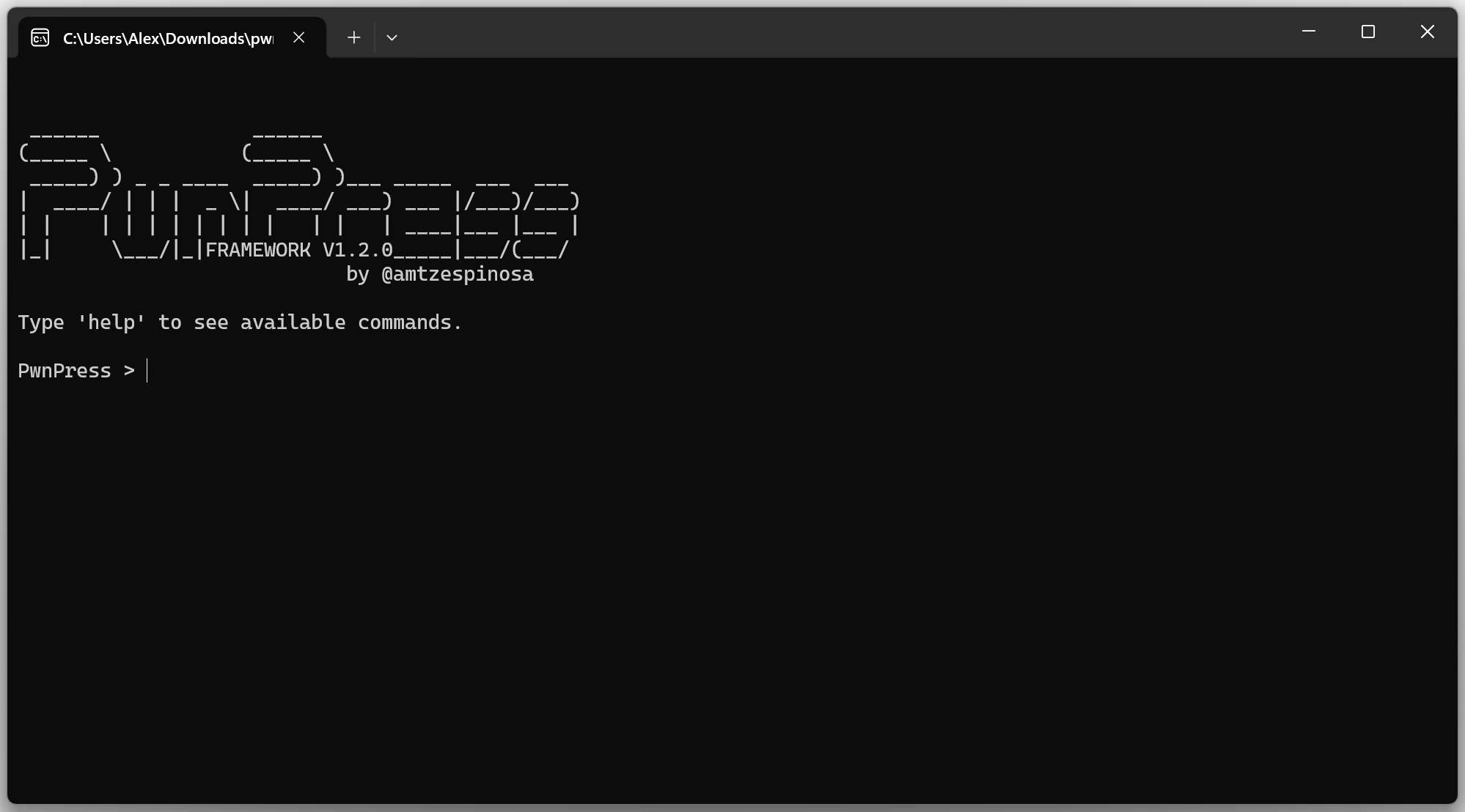PwnPress Framework is here, time to ditch WPScan (and my WPyScan)
PwnPress Framework is a powerful and automated WordPress vulnerability scanner - the exploitation tool part stills under development and looking for colaborators. It can scan WordPress sites (in the same way as WPScan) and it aims detect and, in the future, also exploit vulnerabilities in WordPress core, plugins, and themes. It is completely free, open source and with no API rate limit.
I know, I know, code is a mess. I will sort that in later versions. First I want to craft an amazing tool. If anyone out there wants to help, you’re welcome!
Contact: hello@pwnpress.org
Features
- Automated scanning: Automatically scans WordPress websites for info gathering and known vulnerabilities.
- Sites validation: It can validate a list of targets to filter only WordPress sites and build a file. It can also filter sites depending on their version status.
- Directory scraping: Recursively scrape any directory to list all files in them.
- Create phishing: Instantly build a default WordPress login phishing page with credentials collection utility that sends gathered credentials to your inbox.
- Leverage XML-RPC: You can leverage XML-RPC for two things: brute force extracted users’ passwords and to test for system.Multicall so you can pingback other websites (you will need a webserver publicly accesible to test for pingback).
- Settings Management: Allows setting constant parameters for scanning and exploitation.
- Request Crafting: Constructs and sends HTTP requests with injected payloads.
- Response Analysis: Analyzes server responses to detect vulnerabilities.
- Exploitation: Attempts to exploit detected vulnerabilities.
- Multiple Exploitation Techniques: Supports SQLi, XSS, RCE, file inclusion, path traversal, SSRF, and insecure file uploads.
Installing & Running
BUGS REPORTING
Please, report any bug or problem in the Issues section.
Option 1 - Java:
With Java installed, you can download the .jar file and run it with the following command: java -jar pwnpress_1.2.0_cli.jar
Option 2 - Debian:
Install openjdk-17-jre: sudo apt install openjdk-17-jre
Then, download the Debian package and install it with the following comand: sudo dpkg -i pwnpress_1.2.0.deb
Now, run the tool: pwnpress
Option 3 - Windows:
Download the .zip file and extract it. Then, just execute the .exe file.
Basic usage
Once the tool is running, type help to show available commands on main menu. From there you can go to other sections and see available commands also typing help. Other generic commands:
back: go back to previous menu.exit: quit the tool.settings: Here you can set/unset some constant values for the tool like number of threads used, constant url, files location…
1
Commands pointed with (*) are still under development and (probably) do not work (at all).
| Section | Description | Commands |
|---|---|---|
| scanner | Scan the specified WordPress URL/domain. This is the main functionality of the tool. It can extract valuable info from a WordPress website including versions and vulnerabilities. | |
| Perform a regular scan over the specified WordPress URL. | scan <url> | |
| Perform a deep scan over the specified WordPress URL. | deep-scan <url> (*) | |
| target | Validate and extract WP versions and status. This is very useful when you have a big batch of sites in a .txt file and want to create a file containing ONLY WordPress sites. | |
| Checks if a single url or domain uses WordPress and saves the urls in a .txt file. | validate <url/domain/file> | |
Checks version status of WordPress for the domains in the file. Flags: --latest, --outdated, --insecure, --all or -a | status <domains_file> [flags] | |
| scraper | Scrape the specified WordPress directory URL. | |
| Recursively scrapes a given directory and prints all files found. | scrape (*) | |
| phisher | Create a WordPress login phishing page. In order to collect the phished data, the tool is using Static Forms API. In the future I intend to add Mockbin and other similar services. | |
| Generate a phishing page for the default WordPress login page. | default | |
| Generate a phishing page for a custom WordPress login page. | custom | |
| bruteforce | Brute force the specified WordPress page and service. | |
| Bruteforce passwords of a WordPress site abusing XML-RPC system.Multicall if enabled. | xml-rpc | |
| Bruteforce common WordPress directories. | directories (*) | |
| pingbacker | Leverage XML-RPC pingback to build a webnet and be able to perform DDoS attacks. | |
| Build a file of urls that can perform requests to other sites from a file containing WordPress sites | webnet <file> | |
| Use a webnet file to perform a DDoS attack. | ddos <url> (*) | |
| exploit | Try to exploit found or common WordPress vulnerabilities. This aims to be an automated exploit tool using exploit modules but at the moment is under development. | |
| Search exploitation modules. | search (*) | |
| Load exploitation modules. | load (*) | |
| Run exploitation modules. | run (*) | |
| Send a custom HTTP request to the server. | request (*) | |
| Connect PwnPress Framework with external tools to enhance exploitation. | external tools (*) |
Looking for colaborators
If you have any skills that you consider relevant for the project, let me know! Join the project:
- Send an email to development@pwnpress.org
- Or use this form: https://pwnpress.org/

